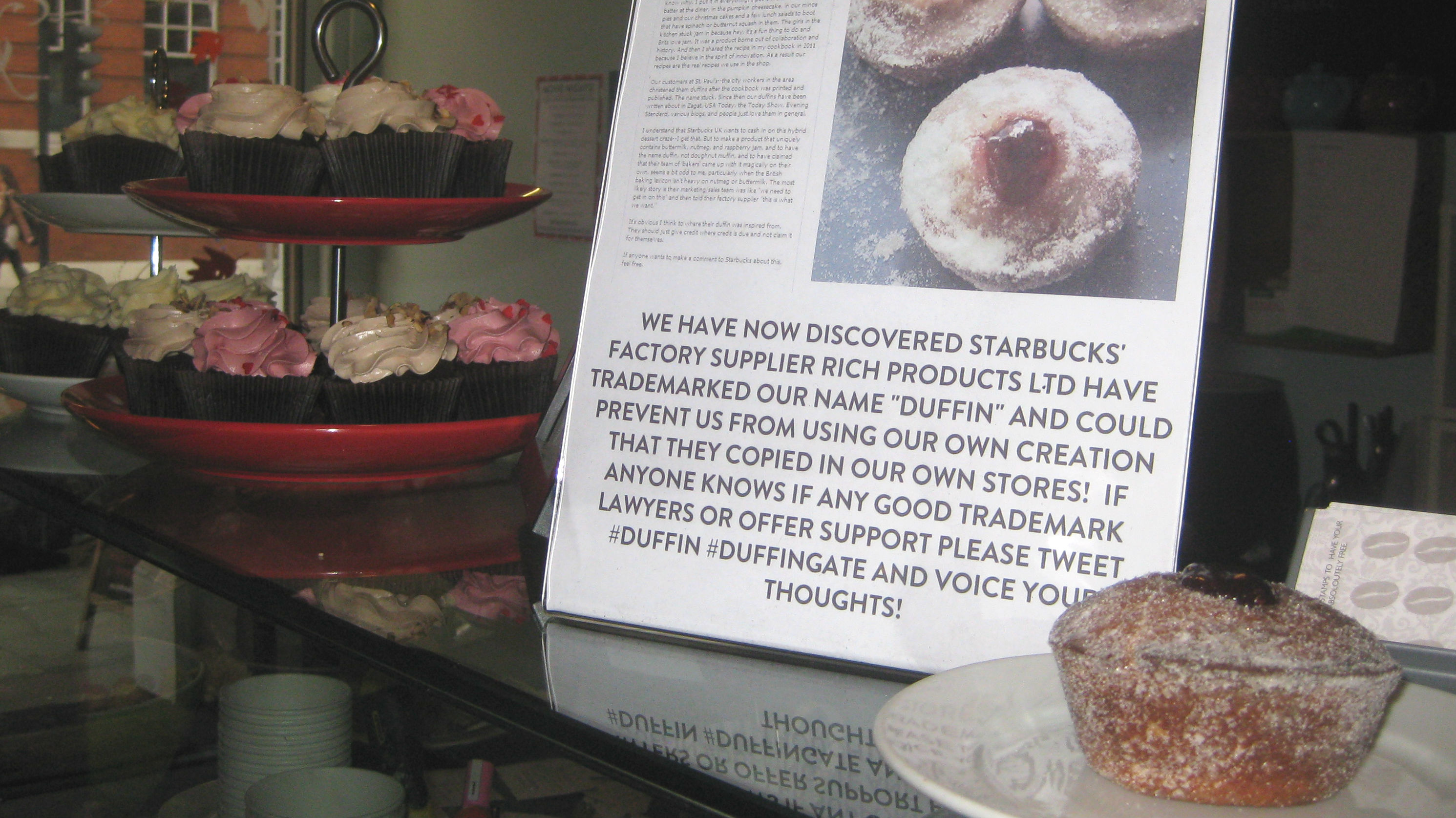Baking bad – how Starbucks provoked a duffin backlash
Is it a doughnut? Is it a muffin? No – it’s a David vs Goliath trademark dispute as the owner of a small London bakery chain takes on the might of Starbucks UK over a recipe she claims as her own.

It’s more than just a cake.
The duffin, a hybrid doughnut-muffin creation which has sold like, well, hot cakes in the small London bakery chain Beas of Bloomsbury for more than two years, has been plunged into the centre of a legal row.
Bea Vo’s version, which she featured in her recipe book Tea with Bea in 2011, was made from a buttermilk and nutmeg batter, baked and stuffed with jam, then dipped in butter and rolled in sugar. Happy customers have been blogging about it, instagramming it, and tweeting about it ever since.
Imagine Vo’s surprise, when a friend alerted her to a blog post by Starbucks, “Introducing the Duffin”. The post continues “Our Duffin is filled with a raspberry jam; we’ve added just a hint of nutmeg to our buttermilk base, then covered it in sugar once baked”.
That sounded rather familiar to Vo – but worse was to come. Rich Products, a multi-billion pound global business which acts as Starbucks’ factory supplier, trademarked the name duffin in July of this year. That meant that Vo’s four cafes would be unable to sell the product she had created.
Vo alerted her customers and followers on Twitter and the news soon went viral, provoking a social media storm. There was even a hashtag – #duffingate. Vo told Channel 4 News she hadn’t invented the doughnut-muffin, but was outraged that a giant corporation should not only copy her version, but try to stop her selling it.
Food inventions should be credited, not trademarked. Bea Vo
“No-one should own the name duffin”, she said. “Food inventions should be credited, not trademarked. I put the duffin recipe in my cookbook for a reason: so people could make them.”
She dismissed the original claim by Starbucks that they hadn’t been aware that anyone else was making a duffin – citing numerous online references, and articles in media outlets ranging from London’s Evening Standard to the American network NBC’s Today Show.
Vo, who comes from New York and before launching her own Beas of Bloomsbury shops, worked as head pastry chef for the Michelin starred Nobu restaurant, says she has plenty of evidence to support her stance.
“I love the fact that Twitter and social media exists”, she said. “So many people have photographed our duffin, written about it and blogged about it over the years that we have the evidence. And, of course, it’s in my cookbook.”
Thanks to social media, the anti-Starbucks backlash spread far and wide. Even the New York Times food critic Pete Wells took up the cause.
Starbucks says its muffin-donut hybrid was “inspired by our muffins.” Funny, for me, Starbucks muffins only inspire regret and despair.
— Pete Wells (@pete_wells) October 8, 2013
Starbucks issued a statement from its Vice President for marketing, Ian Cranna, declaring they would not try to stop Bea Vo selling her cake. “Since launching, we have discovered there are other duffins out there in the UK, including at Beas of Bloomsbury”, he said.
“However we’d like to make it clear that neither Starbucks nor Rich’s Products has suggested to Beas of Bloomsbury that they will attempt to stop them selling their own duffins”.
Vo says she’s been taking advice from her lawyers, but can’t afford to go ahead with any costly legal action. What she wants is for Starbucks to release the trademark altogether.
Since launching, we have discovered there are other duffins out there. Ian Cranna, Starbucks UK
“They’ve said publicly that they won’t stop us selling the duffin, but that is the whole point of trademarking a name, it means you can stop other people trading with it”, she said, fearing there was nothing to stop the coffee giant from re-asserting its trademark rights a year or two down the line.
Vo has also come up with some other bakery hybrid creations, inspired by the now cult-status Cronut, or Croissant Doughnut, invented by New York patisserie maestro Dominique Ansel – who, incidentally, trademarked the Cronut name to preserve his own brand.
Vo’s most successful mash-up has been the townie, or a cross between a brownie and a tart. But she doesn’t intend to protect its legal status either, insisting recipes and concepts should be free to everyone.
But she says it is testimony to her decision to protect her own business against a giant corporation that she’s attracted so much support from around the world. “It’s really heartwarming and sweet, but whether that will translate into Starbucks and Rich Products actually stepping down and releasing the trademark is another matter”.
A doughnut-muffin by any other name would taste as sweet.